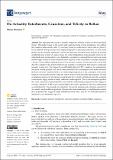| dc.contributor.author | Privoznov, Dmitry | |
| dc.date.accessioned | 2023-09-27T20:06:41Z | |
| dc.date.available | 2023-09-27T20:06:41Z | |
| dc.date.issued | 2023-07-24 | |
| dc.identifier.uri | https://hdl.handle.net/1721.1/152283 | |
| dc.description.abstract | This paper presents a study of actuality entailments in Balkar (a dialect of Karachay-Balkar, Turkic). The study focuses on the deontic and causal meanings of four morphemes: two suffixes (the causative suffix and the suffix <i>-al</i> (‘can/may’)) and two verbs (<i>bujur</i> (‘order’) and <i>qoj</i> (‘allow’)). In the first half of the paper, I provide empirical support for three generalizations: (a) only causal modals can have actuality entailments (all universal and some existential causal modals); (b) actuality entailments arise whenever a causal modal has a telic interpretation, more precisely, when it is not embedded under an imperfective or a delimitative operator (c) existential but not universal causal modals trigger an anti-actuality entailment under negation. In the second half of the paper, I propose a theory of root modality within the framework of situation semantics. In this framework, root modals describe a situation (the anchor situation) and quantify over situations that stand in a particular semantic relation to it. The proposed Causal Modality Theory (CMT) consists of two assumptions: (a) Causal modals quantify over causal chains initiated by the counterparts of the anchor situation. (b) Some existential causal modals have a conditional presupposition: if any counterpart of the anchor situation caused another situation, then the anchor situation itself caused the same situation. The first assumption explains why all universal causal modals have actuality entailments and why existential causal modals trigger an anti-actuality entailment under negation. The second assumption predicts that some existential causal modals (the ones with the conditional presupposition) also trigger an actuality entailment. CMT treats causal modals as bi-eventive predicates, like (non-culminating) accomplishments. They describe two situations: the anchor situation and a situation caused by it. As a result, causal modals are predicted to behave like (non-culminating) accomplishments, namely, they are predicted to trigger actuality entailments if and only if they are not embedded under an imperfective or a delimitative operator. | en_US |
| dc.publisher | Multidisciplinary Digital Publishing Institute | en_US |
| dc.relation.isversionof | http://dx.doi.org/10.3390/languages8030178 | en_US |
| dc.rights | Creative Commons Attribution | en_US |
| dc.rights.uri | https://creativecommons.org/licenses/by/4.0/ | en_US |
| dc.source | Multidisciplinary Digital Publishing Institute | en_US |
| dc.title | On Actuality Entailments, Causation, and Telicity in Balkar | en_US |
| dc.type | Article | en_US |
| dc.identifier.citation | Languages 8 (3): 178 (2023) | en_US |
| dc.contributor.department | Massachusetts Institute of Technology. Department of Linguistics and Philosophy | |
| dc.identifier.mitlicense | PUBLISHER_CC | |
| dc.eprint.version | Final published version | en_US |
| dc.type.uri | http://purl.org/eprint/type/JournalArticle | en_US |
| eprint.status | http://purl.org/eprint/status/PeerReviewed | en_US |
| dc.date.updated | 2023-09-27T12:35:57Z | |
| dspace.date.submission | 2023-09-27T12:35:57Z | |
| mit.license | PUBLISHER_CC | |
| mit.metadata.status | Authority Work and Publication Information Needed | en_US |
